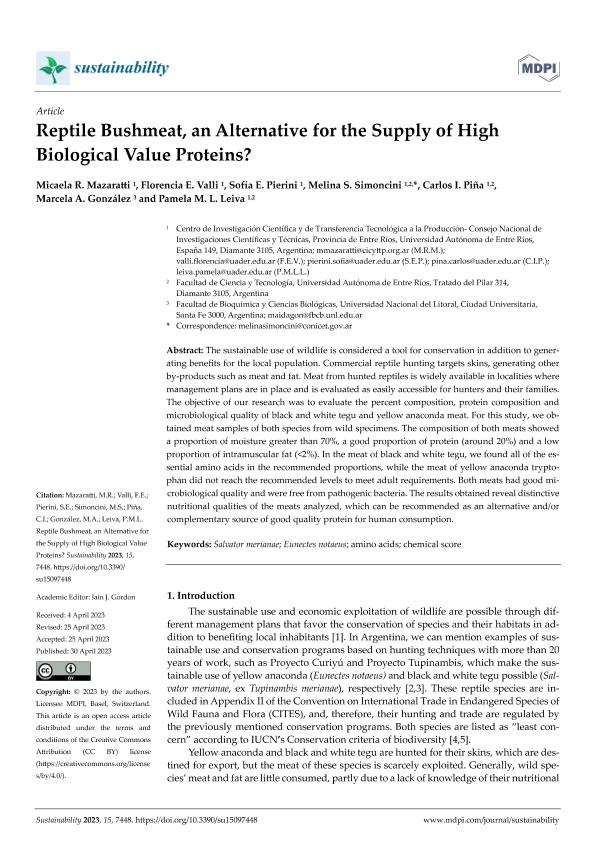Artículo
Reptile Bushmeat, an Alternative for the Supply of High Biological Value Proteins?
Mazaratti, Micaela Rocio; Valli, Florencia Elizabeth ; Pierini, Sofía Evelyn
; Pierini, Sofía Evelyn ; Simoncini, Melina Soledad
; Simoncini, Melina Soledad ; Piña, Carlos Ignacio
; Piña, Carlos Ignacio ; González, Marcela Aída; Leiva, Pamela Maria de Lujan
; González, Marcela Aída; Leiva, Pamela Maria de Lujan
 ; Pierini, Sofía Evelyn
; Pierini, Sofía Evelyn ; Simoncini, Melina Soledad
; Simoncini, Melina Soledad ; Piña, Carlos Ignacio
; Piña, Carlos Ignacio ; González, Marcela Aída; Leiva, Pamela Maria de Lujan
; González, Marcela Aída; Leiva, Pamela Maria de Lujan
Fecha de publicación:
04/2023
Editorial:
Multidisciplinary Digital Publishing Institute
Revista:
Sustainability (Switzerland)
ISSN:
2071-1050
Idioma:
Inglés
Tipo de recurso:
Artículo publicado
Clasificación temática:
Resumen
The sustainable use of wildlife is considered a tool for conservation in addition to generating benefits for the local population. Commercial reptile hunting targets skins, generating other by-products such as meat and fat. Meat from hunted reptiles is widely available in localities where management plans are in place and is evaluated as easily accessible for hunters and their families. The objective of our research was to evaluate the percent composition, protein composition and microbiological quality of black and white tegu and yellow anaconda meat. For this study, we obtained meat samples of both species from wild specimens. The composition of both meats showed a proportion of moisture greater than 70%, a good proportion of protein (around 20%) and a low proportion of intramuscular fat (<2%). In the meat of black and white tegu, we found all of the essential amino acids in the recommended proportions, while the meat of yellow anaconda tryptophan did not reach the recommended levels to meet adult requirements. Both meats had good microbiological quality and were free from pathogenic bacteria. The results obtained reveal distinctive nutritional qualities of the meats analyzed, which can be recommended as an alternative and/or complementary source of good quality protein for human consumption.
Palabras clave:
AMINO ACIDS
,
CHEMICAL SCORE
,
EUNECTES NOTAEUS
,
SALVATOR MERIANAE
Archivos asociados
Licencia
Identificadores
Colecciones
Articulos(CCT - SANTA FE)
Articulos de CTRO.CIENTIFICO TECNOL.CONICET - SANTA FE
Articulos de CTRO.CIENTIFICO TECNOL.CONICET - SANTA FE
Articulos(CICYTTP)
Articulos de CENTRO DE INV.CIENT.Y TRANSFERENCIA TEC A LA PROD
Articulos de CENTRO DE INV.CIENT.Y TRANSFERENCIA TEC A LA PROD
Citación
Mazaratti, Micaela Rocio; Valli, Florencia Elizabeth; Pierini, Sofía Evelyn; Simoncini, Melina Soledad; Piña, Carlos Ignacio; et al.; Reptile Bushmeat, an Alternative for the Supply of High Biological Value Proteins?; Multidisciplinary Digital Publishing Institute; Sustainability (Switzerland); 15; 9; 4-2023; 1-10
Compartir
Altmétricas



